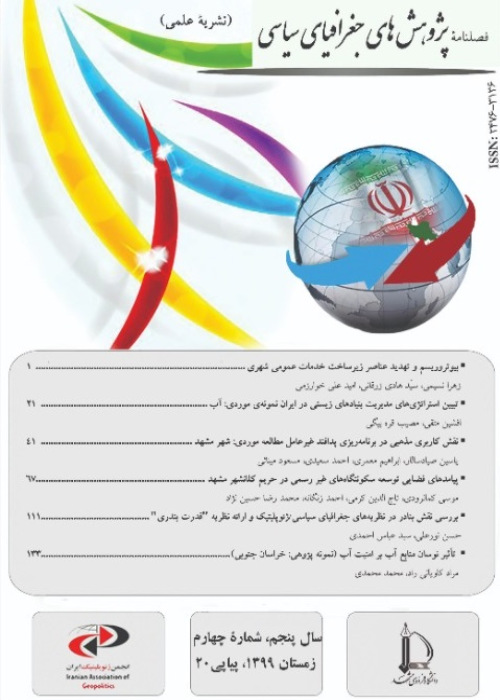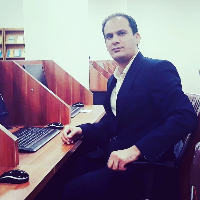Explaining the Relationship between Tribalism and Citizenship Rights (Case Study: Parliamentary Elections in Mamasani County)
1.
Citizenship and citizenship rights are important legal and political concepts that can have different functions in traditional and new societies. Mamasani is one of the counties of Fars Province, which still has its traditional structure. Formation of clan and tribal tendencies in this county associated with the ranks of residents suggests that citizenship rights can be influenced by political and tribal considerations especially during elections. In addition, victorious candidates in parliamentary elections may have a tribalism approach to citizens’ issues, and their sense of belonging to their clan and family is a prominent feature of candidates’ personality, rather than being representative of the public. An attempt to divide individuals (outsider and insider) can lead to strengthen and weaken the various regions of the county. Tribal nationalism may be increased among those feeling that their rights have been violated. It affects the components of freedom and justice known as citizenship rights and causes the next election cycle turn into a conflict. Obviously, the emphasis on tribal issues in an election can affect the positive and negative freedom of the people’s independence. The present research has questioned the relationship between tribal culture and civil rights in Mamasani county. It seems that there is a meaningful relationship between the two variables of tribal culture and citizenship rights, and the attitudes of the tribal elite have a key role in ignoring the rights of citizens in the Mamasani County.
2.
Theoretical Framework
Citizenship rights
Citizens’ rights or civil freedom are a set of civil, political, economic, and social rights that a person has as a member of community. The set of freedoms that people of a community have, the so-called individual rights, freedoms and the general rights of citizens, are also considered as the human and citizens’ rights.
Positive and Negative Liberties
Positive freedom means individual autonomy to act according to reason and the right of participate. In contrast to the concept of positive liberation, the concept of negative liberty defends the basis of liberalism. As Berlin (2003) states, "If I cannot do what I want because of the interference of others, I will lose my freedom, and if the interference of others expand so that the scope of my freedom is less than minimal, I've been taken as a slave”.
Election
Elections are the most important means of responding to public opinion, demands and preferences. It shows the social bases of political power. It is a good criterion for assessing the distribution of power in the society. Election is a democratic way of selecting the institutions for public representation, and building the foundation of legitimate democratic structures.
Tribe and Tribalism
A cultural unit is composed of an interconnected human community in a geographic space in which people have a common perception of each other's characteristics and interests. Accordingly, tribalism assumes that residents form a coherent whole together and have a collective and local identity based on their characteristics, and social, economic, and cultural identities. This collective identity brings about collective unity, social cohesion and social solidarity.
3.
The aim of the present research is twofold. In terms of purpose, it is fundamental and also applied. Nevertheless, its fundamental aspect can be considered as its dominant one. In terms of ontology and methodology, the research is a descriptive and analytical study that investigates the relationship of two variables of tribalism as an independent variable, and the rights of citizenship as a dependent variable. Data were collected through the library, field observations and statistical analysis of the questionnaire.
4. Findings and
Findings of the research show that one of the factors of the formation of clan tendencies and its socio-political culture in Mamasani County has been based on human work in history. This culture has faced with members of various tribes over the time with doubt, and taught them to pursue the goals through overcoming the "other". Accordingly, traditions are preferred more than rational choice, emphasizing the common history and tribal morale. It is the basis of individuals’ performance in Mamasani; thus, it limits the positive freedom. Based on these findings, the mental and objective effects of tribalism culture affect the negative freedom of citizens, their privacy and thoughts. The kinship groups play the most important role in stimulating the traditional pattern in the minds of individuals and they are forced to accept social and political life of the tribesmen. In this regard, the institutionalization of the tribal life and the safeguarding of traditions are also objectively apparent. The election of the Islamic parliament is an area for showing and proving themselves to the other tribes. The deprivation of the positive and negative freedom of citizens in Mamasany County, in addition to influencing the individual's attitude through the tribal and traditions, is influenced by other influential groups elites and social forces. On the election day, they practically take the citizens to the service of the tribal desires. Thus, the rights of citizenship are ignored. The findings also suggest that kinship groups make it possible spontaneously or deliberately to mobilize the masses on the basis of clerical culture and neglect the citizenship rights. Generally, the domination of clan culture in the electoral space leads to neglecting the citizenship rights through depriving the positive and negative liberties of the independence and vote; creating an atmosphere of emotional and irrational political participation; providing a field of ineffective participation in the political destiny of the land management; the lack of respect to the citizens' privacy; creation of conditions for the victorious candidates to regard their tribe and the unequal allocation of funds facilities and management positions in different parts of the city.
- حق عضویت دریافتی صرف حمایت از نشریات عضو و نگهداری، تکمیل و توسعه مگیران میشود.
- پرداخت حق اشتراک و دانلود مقالات اجازه بازنشر آن در سایر رسانههای چاپی و دیجیتال را به کاربر نمیدهد.



